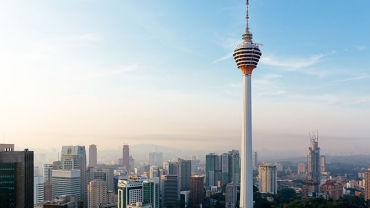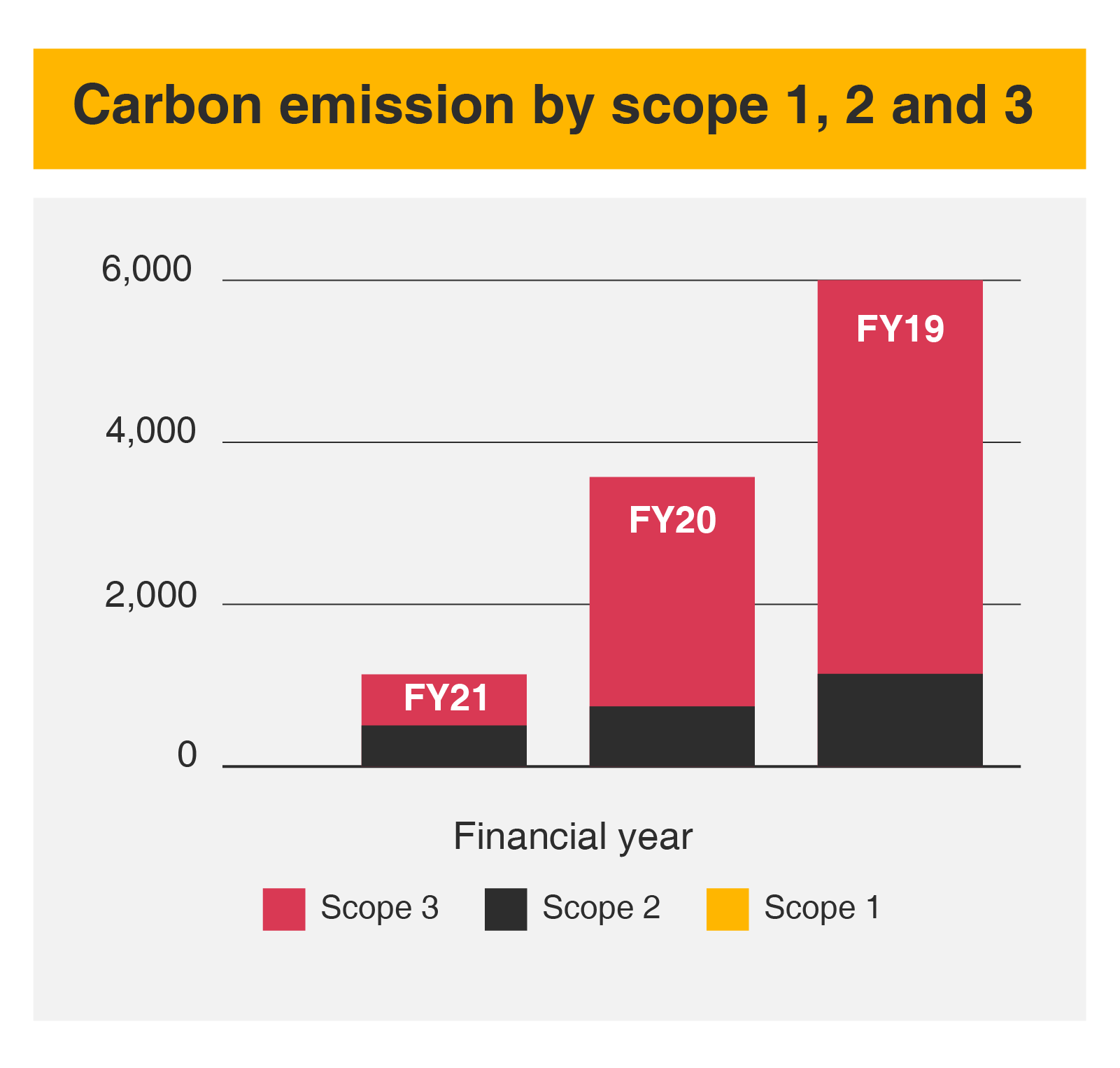
Environmental sustainability and net zero
Achieving net zero
As outlined in PwC’s global strategy, The New Equation, we have committed to achieving net zero with 2030 goals. Our net zero commitment will require us to transform our business model to decarbonise our value chain, increase transparency, and support the development of robust environment, social and governance (ESG) reporting frameworks and standards. The PwC network will also engage with clients and suppliers to support them in tackling their climate impact.
Our net zero commitment involves 3 main areas:
1. Halve our emissions |
|
Reduce absolute scope 1 and 2* greenhouse gas (GHG) emissions by 50% by FY30 from a FY19 base year - by driving energy efficiency in our offices. |
|
Reduce absolute scope 3* business travel GHG emissions by 50% within the same timeframe - by reshaping our client service model to balance remote and on-site working and reducing business travel. |
|
Engage with our suppliers to tackle their climate impact - 50% of purchased goods and services are from suppliers (by emissions) will have science-based targets by FY25. |
|
Switch to 100% renewable electricity From 2030, invest in carbon removal projects to eliminate our remaining operational emissions. |
|
*Scope 1 or direct GHG emissions occur from sources that are owned or controlled by the firm, for example, emissions from combustion of fuel in boilers, furnaces or PwC owned or controlled vehicles. Scope 2 is or indirect GHG emissions occur from the generation of purchased or acquired energy consumed by the firm. This includes both electricity and heating or cooling that is purchased or otherwise brought into the organisational boundary of the firm. Scope 3 emissions are all indirect emissions (not included in scope 2) that occur in the value chain, including both upstream and downstream emissions.
2. Work with our stakeholders |
|
Advance non-financial reporting so stakeholders understand the impacts of business on climate and nature. |
|
Embed the implications of climate change and other ESG-related factors into our client work. |
|
3. Public policy discussion |
|
To advance thinking about how we can influence regulators that address climate change. |
|
Since our announcement in September 2020, we have put the following in place:
Governance and resourcing
Established roles and reporting lines for net zero (NZ)
Strategy to achieve net zero with 2030 goals
Driven by a NZ lead partner, reporting to the Executive Board
Supported by the Corporate Sustainability team [equivalent to 1 full-time employee (FTE)] and expertise from Sustainability & Climate Change (S&CC) team
A group of partners across Lines of Service providing a One Firm approach to ESG-related services.
Measurement and disclosure
- Identify offices and data needed for Scopes 1, 2 and 3, and data sources / stakeholders
Collect data from FY19 for Scopes 1 , 2 and 3
- Completed pre-Assurance of our data in 2021. We have committed to complete Assurance of our data by 2022.
Renewable energy and carbon offsets
- We have offset 100% of our air travel since FY19. We plan to review renewable energy providers available in Malaysia in the coming year
- Together with other PwC territories, we have joined the LEAF (Lowering Emissions by Accelerating Forest finance) coalition, to support what is expected to become one of the largest ever public-private efforts to protect our tropical forests.
We have our work cut out for us, in reducing our emissions by 50% by 2030. We will do this by continuing the work mentioned above and the following measures:
1. Emissions reduction
Review energy usage in our offices and put in place measures to reduce energy use.
Pilot programme to reduce flights when travel resumes
Review internal business travel policy
Work with our clients to reshape our client service model.
Continuous process improvement for efficiency and to reduce use of resources.
An example of this is our Digital first campaign to encourage a digital mindset, printing rationalisation to reduce printers and printing activities and in July 2021, we started using Docusign, a service which allows us to manage electronic agreements securely. Within 8 months, we have sent over 6,200 documents and avoided printing 84,600 pages.
In FY21, the Human Capital team have also taken advantage of the work-from-home situation to improve on documentation:
Document collection for new joiners are now completed via Google Forms as compared to hard copy submission previously
ePersonal files are used instead of physical files
Digital offer letters, training contracts and promotion letters
Digitised processes e.g. recruitment and resignation.
2. Work with our stakeholders
Supply chain decarbonisation
In ensuring a just transition, we will engage our suppliers to create awareness about climate change and work with them on steps to reduce their climate impact.
Collaborating to create an ecosystem for sustainable development in Malaysia
We are active in the CEO Action Network (CAN). CAN is a coalition of over 50 CEOs working to drive sustainability by shaping policies, working with stakeholders, and creating a favourable ecosystem for sustainable business and development.
We are a steering committee member, we lead a workstream on capability and awareness. We are also involved in the policy and advocacy workstream and we are members of the collective commitment working group.
In 2020, as part of the Capacity Building workstream, we organised:
- 4 peer-sharing sessions on climate change, energy management, labour practices and waste & water. The sessions were attended by over 500 people.
- In addition, we compiled the report of proceedings on the inaugural Roundtable CAN sessions, covering 14 sessions, 4,112 attendees, 50 speakers and 4 industry sectors. The report was released in April 2022.
3. Upskilling our people
At the end of 2021, we have rolled out 2 mandatory e-learns on climate change, so that our people are informed about the impact of climate change on our planet, and to our clients. We will be rolling out more client-specific training through our ESG Academy platform so that our people are prepared to address climate change-related issues with their clients.
We have offset 100% of our air travel since FY19
While our priority is reducing our absolute carbon impact, offsetting is an important part of our strategy to mitigate the impact of our unavoidable emissions.
With the ongoing impact of the pandemic, we have seen our emissions reduce in line with government lockdown measures since March 2020 - and with our entire workforce continuing to work from home at various stages throughout 2020 until 2021 (FY20 and FY21), we have seen our scope 1 and 2 emissions decline by 71% and 26% respectively, from FY20.
Air travel (scope 3) is our largest source of carbon emissions, and, as expected, we saw a large reduction from FY20 – of 95% – due to the continuing restrictions on both domestic and international air travel.
Our total GHG emissions have reduced by 69% from FY20 levels, with our GHG emissions in FY21 being 1,127 tonnes CO2e compared to 3,619 tonnes CO2e in FY20.

Contact us


















